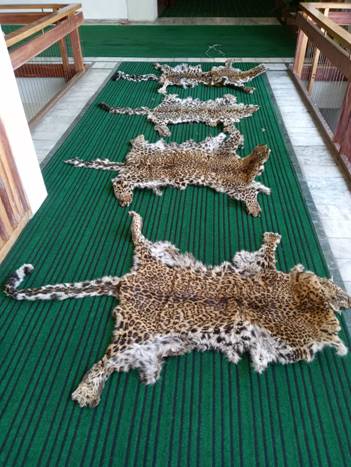Major Wildlife Trafficking Bust: 4 Leopard Skins Seized in Srinagar, Jammu and Kashmir

In a significant operation, officials from the Directorate of Revenue Intelligence (DRI) have successfully apprehended a wildlife trafficking network responsible for the illegal trade of leopard skins in Srinagar, Jammu and Kashmir. This operation comes as a result of meticulous intelligence gathering by the DRI, revealing the involvement of certain gangs in the region in the unlawful wildlife trade.
After diligent investigation, it was discovered that these gangs were actively seeking potential buyers for leopard skins. In response, the DRI initiated a comprehensive plan to apprehend the members of these criminal networks.
Undercover agents from the Mumbai Zonal Unit (Goa Regional Unit) posed as buyers and infiltrated Srinagar. After numerous rounds of negotiations, the criminals brought the first leopard skin to a predetermined location near Dalgate in Srinagar. Swift action was taken as surveillance officers intercepted an individual carrying the illicit leopard skin. Based on the information provided by this individual, another accomplice was apprehended in a public area of Srinagar.
Continuing the operation, negotiations persisted with a different group of sellers. After extensive discussions, the criminals finally agreed to deliver three additional leopard skins to a predetermined location. In a coordinated effort, three individuals in possession of the contraband were intercepted. The leads generated from these apprehensions further guided the authorities to three more individuals linked to the illicit transaction. Two tactical teams were dispatched promptly, resulting in the interception of the three individuals at a public location. Consequently, a total of eight individuals, including an active police constable, were apprehended in connection with this wildlife trafficking operation. The investigation’s initial findings indicate that the leopards were poached from the regions of Ladakh, Doda, and Uri.
The four seized leopard skins, considered crucial evidence in this case, have been confiscated under the provisions of section 50(1)(c) of the Wildlife (Protection) Act, 1972, which has been amended to ensure more robust protection for wildlife.
Following the seizure, all eight individuals involved in the illegal trading of wildlife, including the serving police constable, were handed over to the officials of the Department of Wildlife Protection, Jammu and Kashmir. This step was taken after the completion of initial seizure proceedings under the Wildlife (Protection) Act, 1972, as authorities are committed to curbing wildlife trafficking and safeguarding the natural heritage of the region.





